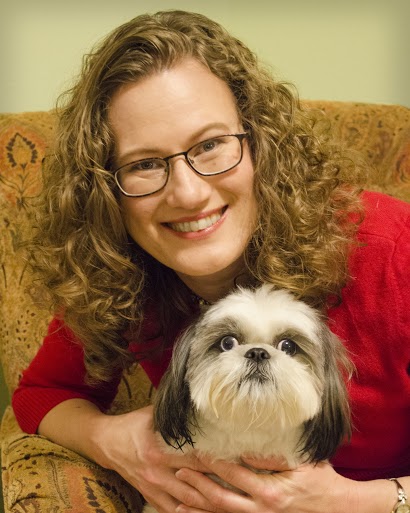History Is For The Dogs
After adopting a small four-legged friend, Lorien Foote shifted her research focus to the historical contributions dogs make to warfare.

By Mia Mercer ‘23

Foote said it was love at first sight when she saw Buzz’s photo on a breeding website. Since bringing him home, Foote has altered her research focus and is constantly inspired by her furry friend at her side.
Nineteenth century history professor Lorien Foote never had a pet. In fact, she had no interest in animals, let alone dogs. But after finding comfort in a friend’s dog while conducting research in Washington D.C. in 2015, she adopted 13-week-old Buzz, a small shih tzu who changed Foote’s life completely.
Before Buzz nuzzled his way into Foote’s life, Foote’s research focused on culture and prisoners of war in the American Civil War. However, Foote was surprised to find the sources she used for research were littered with references to the role dogs played throughout the war. Inspired by her discovery as well as the four-legged friend now living with her, Foote decided to shift her research focus to the historical contributions dogs make to warfare.
“For the first time in my life I was experiencing the world of a human/dog interaction,” Foote said. “I was now focused on my own dog, and seeing how emotionally rich and intelligent he is were some things I had not realized about dogs. I started to wonder about the dog’s perspective on what was happening in the past and it’s that combination of seeing it in the sources and adopting Buzz where my world opened up to dogs.”
Traditionally, when thinking of animals in warfare, cavalry horses and oxen pulling machinery and goods come to mind. But Foote’s research revealed dogs also played a central role in warfare. She found that they were pivotal to hunting, security scenes, and attack formations used by Confederate armies during the Civil War.
“While I was researching for Rites of Retaliation, I came across so many references to dogs being used by Confederates to watch enslaved people to make sure they weren’t escaping to Union Army lines or how dogs were used to chase escaped Union prisoners during the American Civil War,” Foote shared. “It was seeing that and thinking, ‘wait a minute, I don’t remember historians talking much about dogs but they seem to be everywhere.’”
For Foote, the most fascinating aspect of her research are the commonalities between the U.S. Army officers before the Civil War and the warrior cultures of indigenous peoples, because dogs were just as important to both warrior societies as honor.
“The current research about dogs is important because it puts animals back into the story of human warfare,” Foote explained. “We need to write about war with the animals in it because we need to understand their importance. When I come across other scholars, they say ‘hunting is really important’ and that’s just one sentence. Well you don’t hunt without your hunting animals so by putting that sentence in there they’re acknowledging dogs are everywhere in the army but yet they never mention dogs. It’s important to recover that animals were present everywhere and we need to explicitly acknowledge that instead of writing in ways that cover up their presence.”
As Foote continues to explore the history of dogs in warfare, her own pooch continues to inspire and influence her work.
“Although shih tzus are not the most intelligent dog breed, Buzz is actually really smart,” Foote shared. “I counted up how many words he knows and it’s about 40 or 50. Just understanding his intelligence, how I trained him, and the books I’ve read on dog training and how dogs think help me understand dog’s capabilities and why their capabilities are hidden so well. Their ability to obey commands instantaneously, their intelligence, their loyalty, their sense of scent, their protective instinct, all of these things that militaries use with dogs to train them to do tasks. Experiencing that myself with Buzz helps me to understand it all better.”

Buzz and Foote do everything together from working at Foote’s desk to going outside to visit friends and neighbors. Foote said she is thankful for Buzz and loves having him in her life.
When Foote isn’t working, she and Buzz enjoy sitting in their driveway at the end of the day and reading books to the neighborhood kids. If Buzz could talk about what he thought of her research, Foote said he would likely ask, ‘is there chicken?’
“Buzz is highly motivated by pieces of chicken and he will do almost anything if he knows there will be chicken at the end of it,” Foote said. “So he would be most interested in the hunting aspect of my research. When he was a small puppy he killed a bird in my backyard, and it was kind of a reminder that dogs are hunters, dogs eat meat, and they can be killers. Buzz would be very interested in the part where I talk about how dogs contribute to hunting birds, because if Buzz was not constrained by me, he would spend a lot more time eating birds and hunting birds than he is allowed now.”
Seven years after adopting her furry best friend, Foote remains passionate about her work and urges people to think about the role animals play in all aspects of our lives.
“I want people to think deeply about what our ethical obligation is to animals,” Foote shared. “When you look at animals in war, it raises a lot of ethical questions because animals are killed in war, animals are wasted in war. We need to think about how we treat animals and how they fit into the nexus of our human society.”
Foote’s research also explores the importance of understanding how humans fit into canine society.
“Animal scientists say dogs became dogs instead of wolves because they were particularly interested in hunting with humans,” Foote explained. “Dogs have their own agency in killing other animals and participating in some things even without human participation. It’s important for us to think about how we fit into all creation, how much responsibility we have, and how humans and non-human animals can learn to live and work together in a way that allows each of us to be the best version of our creatureness.”
